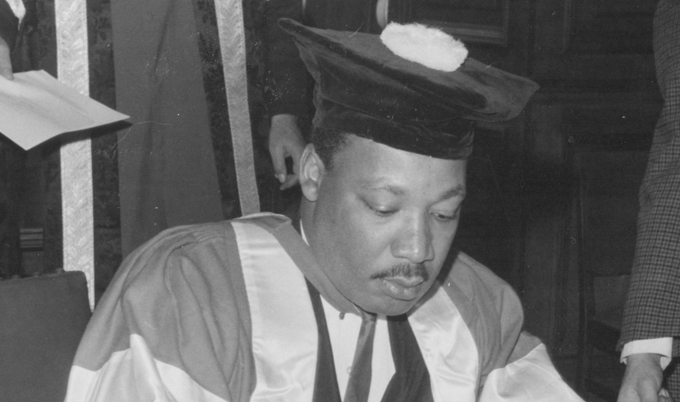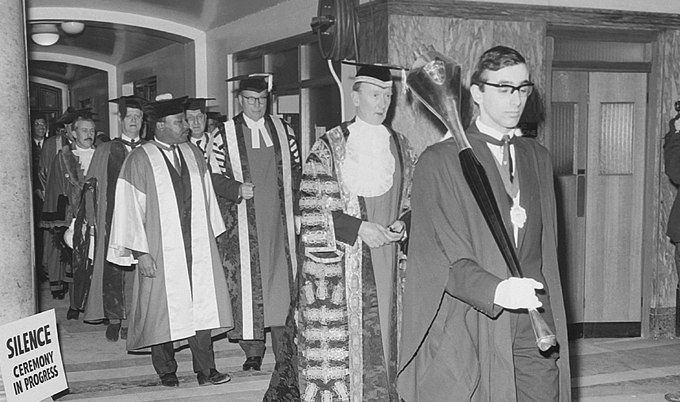Martin Luther King
On November 13, 1967, Dr. Martin Luther King Jr. became a recipient of an Honorary Doctorate in Civil Law presented by the Chancellor and Vice-Chancellor of Newcastle University.
After which, Dr. King addressed the audience about his own work, and that of many like him, on the progress made towards racial justice.
His words at the time were in opposition to the racial prejudice that existed in culture, society and law. The laws of today, which are based on empirical values of fairness were not available to African-Americans and other minorities during his lifetime.
Much of the younger generations that pass through the halls of this building will never experience that same prejudice.
Unfortunately, the relevance of his speech on racial injustice is still very relevant today. We must not forget the words of Dr. King and the others who fought so hard, and still do, for equality.

Dr Martin Luther King Jr at the graduation ceremony - Image courtesy of Special Collections at the Philip Robinson Library, Newcastle University
Legacy of MLK
Dr. Martin Luther King Jr. is considered, not only in the United States, but also worldwide, as one of the greatest champions of civil liberties in history.
He spoke not only of the injustices that faced African-Americans but also other minority groups such as in South Africa.
His legacy was not one of insurrection or rebellion, but of promoting a shared brotherhood and sisterhood of humankind.
Through peaceful protest and intellectual debate Dr. King secured a platform upon which he could share his ideas with the wider world; Newcastle was one of those places.
Imbuing passion with intellect his speeches are studied in schools and Universities around the world. ‘I Have a Dream’ remains a part of the British Education system to teach young minds about the astonishing power of words.

Civil Liberty in Newcastle
With 20% of the population non-European, Newcastle upon Tyne is one of the most diverse cities in the North of England.
Every year it sees large celebrations such as the Chinese New Year festivities, taking place in Newcastle’s Chinatown.
The city also hosts the unique Newcastle Mela, which combines music and food from Punjabi, Pakistani, Bengali and Hindu cultures in a two-day event.
Muslim Youth and Political Participation in Scotland
One aspect of the Freedom City 2017 project was Newcastle University’s research into Muslim Youth Politics in Scotland.
This was done by Robin Finlay, Peter Hopkins, and Gurchathen Sanghera, in part to carry on the legacy of Dr. Martin Luther King Jr’s aims for social renewal.
The research covered the political concerns, participation and barriers to young Muslims in Scotland. The political concerns addressed were focused mainly around global events, such as the rise of the so-called Islamic State of Iraq and Syria.
The project looked at how the actions of extremist groups have negative ramifications that affect the public perception of Muslim communities in Scotland.
Local politics were also explored, such as personal identity in the Muslim communities in Scotland and the dynamics of personal identity.
Most under-18s interviewed expressed their concerns over stereotyping of Muslims in the media but stated their intentions to change these generalisations.
Participation of Young Muslims
The research conducted by Newcastle University explored ways that young Muslims in Scotland engaged with politics regarding social movements and activism.
Most spoke candidly about their opinions and involvement with politics, particularly after the Scottish Independence referendum of 2014.
This was partly spurred on by the lowering of the voting age to 16 in Scotland, which allowed the younger generation to express their opinions through the democratic process. The prominence of social media usage within the age group studied, as platforms for opinion and debates, were easier to access by people under 16.
The participants could ascertain one party’s policies from another by their involvement in services such as Facebook or Twitter.
There were many forms of activism used by the youth groups, including charity work, leafleting and involvement in Islamic Societies at Scottish universities.
Challenges to Participation
For the majority, Islamophobia and racism are the main barriers to Muslim Youths in Scotland by indirect or direct means.
Fears over the radicalisation of young Muslims has made it difficult in the current political climate to express opinions due to the growth of suspicion and fear.
Further challenges include inequalities between the sexes in the Muslim community and a lack of political education in schools.
